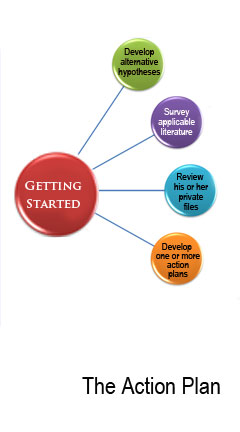Archival Notice
This is an archive page that is no longer being updated. It may contain outdated information and links may no longer function as originally intended.
Home | Glossary | Resources | Help | Course Map
Often, the most difficult part of any task is getting started. The expert should complete four basic tasks when approaching a new assignment:
- Develop alternative hypotheses.
- Survey applicable literature.
- Review his or her private files.
- Develop one or more action plans.
"Action plan" is a catch-phrase for an organized way to break a large project into steps and sub-steps. It is an easy way to track progress and identify what needs to be done.
Many public and private experts follow some type of procedure for tracking work effort through individual assignments. Attorneys sometimes use tracking systems they have developed. Labs typically have tracking procedures in place.
Other experts use schedules, notes describing items that require followup, and checklists. Some experts use a standard procedure, and others do so more informally or when circumstances require it.
In situations where action plans have been used, cases are usually ready for trial on time. The chance of a successful result is significantly increased when all parties take a well-organized, pragmatic approach to the project. Because some forensic assignments are massive, the task must sometimes be broken into manageable parts.
If the action plan is prepared by the attorney, it may be a work product — the lawyer's own thought processes — and should receive very limited distribution. As such, it may be privileged and not discoverable. Without the attorney work-product blanket of protection, the action plan may be discoverable.
Additional Online Courses
- What Every First Responding Officer Should Know About DNA Evidence
- Collecting DNA Evidence at Property Crime Scenes
- DNA – A Prosecutor’s Practice Notebook
- Crime Scene and DNA Basics
- Laboratory Safety Programs
- DNA Amplification
- Population Genetics and Statistics
- Non-STR DNA Markers: SNPs, Y-STRs, LCN and mtDNA
- Firearms Examiner Training
- Forensic DNA Education for Law Enforcement Decisionmakers
- What Every Investigator and Evidence Technician Should Know About DNA Evidence
- Principles of Forensic DNA for Officers of the Court
- Law 101: Legal Guide for the Forensic Expert
- Laboratory Orientation and Testing of Body Fluids and Tissues
- DNA Extraction and Quantitation
- STR Data Analysis and Interpretation
- Communication Skills, Report Writing, and Courtroom Testimony
- Español for Law Enforcement
- Amplified DNA Product Separation for Forensic Analysts


